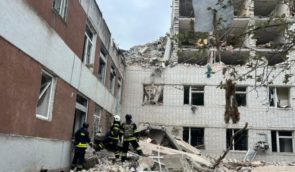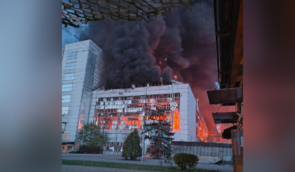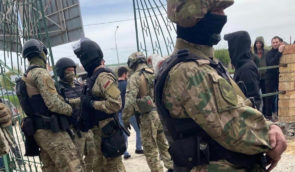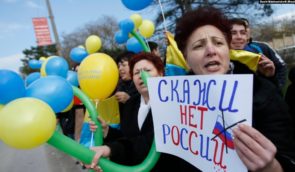Russian Soldiers Tell about their Involvement in the Conflict in Donbass
Normal
0
false
false
false
RU
X-NONE
X-NONE
/* Style Definitions */
table.MsoNormalTable
{mso-style-name:”Обычная таблица”;
mso-tstyle-rowband-size:0;
mso-tstyle-colband-size:0;
mso-style-noshow:yes;
mso-style-priority:99;
mso-style-qformat:yes;
mso-style-parent:””;
mso-padding-alt:0cm 5.4pt 0cm 5.4pt;
mso-para-margin-top:0cm;
mso-para-margin-right:0cm;
mso-para-margin-bottom:10.0pt;
mso-para-margin-left:0cm;
line-height:115%;
mso-pagination:widow-orphan;
font-size:11.0pt;
font-family:”Calibri”,”sans-serif”;
mso-ascii-font-family:Calibri;
mso-ascii-theme-font:minor-latin;
mso-fareast-font-family:”Times New Roman”;
mso-fareast-theme-font:minor-fareast;
mso-hansi-font-family:Calibri;
mso-hansi-theme-font:minor-latin;}
Russian soldiers are being sent to fight in Donbass under the guise of training exercises, and many of them have left the armed forces in order to not participate in hostilities.
As Reuters reports, these soldiers’ stories call into question the Kremlin’s assertions that there are no Russian troops in Ukraine, and that the Russians who are fighting in the militias are only volunteers.
Reuters spoke with the soldiers who have left the service, including some who did so after learning that soldiers are being sent to Ukraine. All of them only agreed to speak on the condition that their anonymity be protected, fearing persecution.
One of them, a Moscow resident, said that he was sent to the Rostov region for exercises last summer, but instead he ended up in Ukraine in a tank as part of armored column.
“After crossing the border, a lieutenant colonel said that you can be imprisoned for non-compliance. Some began to refuse to continue to be there,” said a former member of an elite Kantemir Tank Division.
According to him, there were two soldiers who refused to fight and that they were taken somewhere. The lieutenant colonel said that a criminal case had been opened against them. But, later, comrades called them and found out that they just quit and went home.
The former tanker from Moscow said that he would not go to Ukraine on his own: “No, why would I? This is not our war. If the troops were there officially, yes, that’s a different matter.”
He says he was sent to Ukraine in late August of last year and returned to Russia in early September during the first peace talks. His crew managed a modernized Russian T-72B3. After returning to Russia, they were promised rewards and benefits, but the soldiers did not receive what was promised. After that, 14 people quit.
Another soldier, who was in command of the targeting calculations of a Grad multiple launch rocket systems, on condition of anonymity, said that they took up positions in Rostov region last summer, about two kilometers from the Ukrainian border.
The officers spoke about the training, but the soldier recalls that the training was as if it was for real fighting: “We drove unmarked. We took off all of the cap badges, patches, chevrons. All of this was removed. They said that everyone goes without it in the field.”
In September, the crew was ordered to open fire on the target which was located approximately 17 kilometers away, perhaps in Ukraine. The soldier said that he was hoping that he wasn’t shooting at real people “or at least missing.”
He learned from his comrades that another battery from his unit crossed the border and had been on Ukrainian territory for 10 days. In late January, he was called back from vacation into active duty in order to go to trainings in the Rostov region. He believes they were talking about Ukraine. He and four other soldiers decided to resign so as not to participate in military operations in Ukraine. Dismissal procedures were completed in March.
Reuters also brought forth evidence of the presence of soldiers from Buryatia [a Republic within the Russian Federation in southern Siberia on the border with Mongolia] in Donbass.
“Buryat politician Dorzho Dugarov says that one of the Buryat soldiers who returned from Ukraine told him that ‘people from the Western part [of Russia] did not want to go, no desire, morale is down.’ 39-year-old militiaman Yevgeniy Romanenko from Donetsk told Reuters that, during the February fighting for Debaltseve, he was the driver of the military truck that was part of an armored column which was accompanied by two tanks with Buryat crews,” reports Reuters.
One of the Buryats was shown on TV in the east of Ukraine when famous Russian singer Iosif Kobzon visited wounded soldiers in Donetsk hospital on February 23 in the presence of the media. One of the soldiers told him that he was a tanker from Buryatia. Later, the Russian outlet Novaya Gazeta published that his name was Dorzhi Batomunkoyev and that he was a soldier from unit 46108 stationed in the Buryatia capital of Ulan-Ude.
On May 12, colleagues of Russian opposition politician Boris Nemtsov, who was killed in February near the Kremlin, plan to release his report “Putin. War,” which contains the testimonies from the relatives of the victims of Russia’s military presence in Ukraine.








